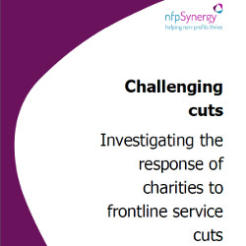Charities should be more proactive and learn from each other when fighting against frontline spending cuts, argues research consultancy nfpSynergy in a report published today.
The report, Challenging Cuts – Investigating the response of charities to frontline service cuts, urges charities to create a stronger evidenced-based approach when applying for funding.
“Evidence is critical to any attempt to reduce a budget cut,” the report says. “Simply saying ‘these services are critical’ will have little effect. How many people use the services? What will the impact be on them? What are the human stories behind the cuts? What have other local authorities or national governments done instead?”
The report also urges charities to be more effective at coordinating campaigns on a national level.
“Wherever people need to start a campaign from scratch at the local level, not only will they lose time but they may not use the most effective arguments,” the report says.
"The most effective campaigns are those where there is a central body which provides advice, insight, materials, research and campaign plans. Without that, each response to cuts is dependent on the energy and experience of those at the local level."
The research was compiled using telephone interviews with ten charities in 2015.
nfpSynergy’s Joe Saxton said the report’s conclusions were “both encouraging and sobering”.
"They are encouraging because of the breadth of ways in which charities can constructively engage and fight against frontline spending cuts. The battle does not have to be, and is not, always hopeless.
"Our research is sobering because we found so little that charities are learning from each other’s experiences of how to fight against, or mitigate the effects of spending cuts. Nobody seems to be joining up the dots, so many frontline charities are starting from scratch in fighting the cuts."
Saxton told Civil Society News it was important for charities to realise that they can respond to cuts to lessen the effects.
"We want to say to people who are facing funding cuts in the current climate, this is what to do about it, this is what’s going on and this is how you can begin to think about tackling it," he said.
"Each individual organisation may be left to work out how to develop a strategy. But that's a daft approach. There needs to be more advice in how to handle things in the form of conferences, seminars and training courses in which people give you ideas in how to respond to things. And there could be a website where people could go to swap experiences."
"The danger is that people think there is nothing we can do," he said. "But that is not the case. There are all sorts of different ways – particularly learning from each other what works and what doesn’t work and what are the effective arguments. That doesn’t seem to have been tried much."
Other action points for charities highlighted by nfpSynergy include for charities to "think like politicians in order to make the best case to reduce funding cuts" and to "learn from the overseas development sector" in getting government aid budgets ring-fenced.









